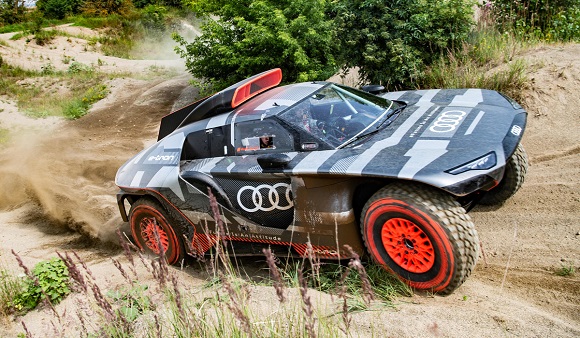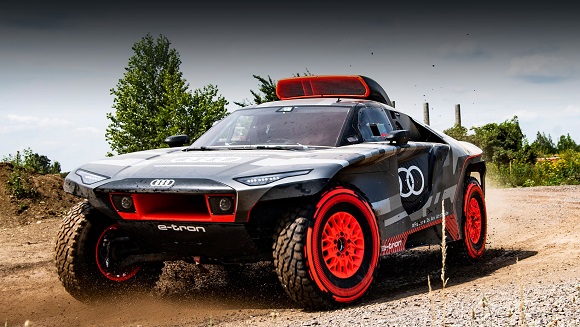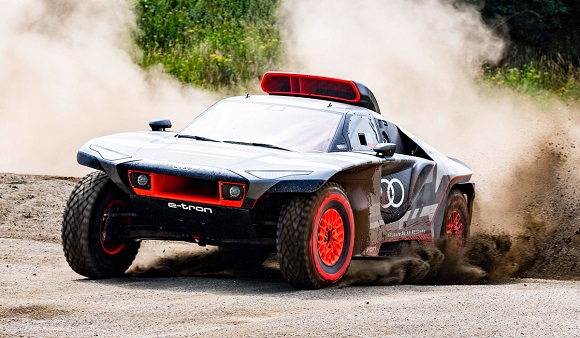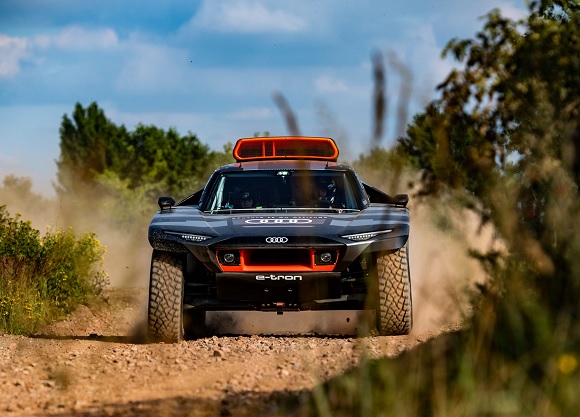
Audi RS Q e-tron for Dakar.
Audi RS Q e-tron for Dakar. The Audi RS Q e-tron will go to the Dakar Rally in 2022.
In the 1980s, the all-wheel-drive Audi Quattro caused a stir in the rally, the line of R18 prototypes, including hybrids, triumphantly performed at Le Mans and other endurance races in 2011-2016.
Now the time has come for a new era for the Dakar, the creators of the machine assure.
The Audi RS Q e-tron is similar in name to the cartoon RSQ e-tron, but has nothing to do with it.
The car presented today is a sequential hybrid (or an electric car with an on-board generator). Here the ICE rotates the generator to replenish the battery charge.
The Germans called this system «energy converter». The wheels are driven only by electric motors (there are separate drive modules on the front and rear axles).
If the judges do not reject the application, this machine will fight for the victory in the overall Dakar standings in January 2022 under the flag of the Q Motorsport team.
Above, the front electrical drive module, the «energy converter» and the rear drive module are exaggerated.
Bottom: the position of these units in the car and charging the battery (green) from the «converter».
Julius Seebach, Managing Director of Audi Sport GmbH and responsible for motorsport at Audi, said: “Our RS Q e-tron was built from scratch in record time.”
And in the era of the gradual rejection of the internal combustion engine, it was the electrical part of the model that received the main attention.
The two electric motors together produce 500 kW (680 hp) here. The electronics play the role of a virtual center differential, constantly redistributing traction between the wheels for the best dynamics in each specific situation.
The model is built on a roll bar with racing wishbone suspension. (Driving by Swedish driver Matthias Ekström.)
Both drives are adapted with a slight modification from the installation of the MGU motor generator of the Audi e-tron FE07 Formula E car.
Another MGU became the basis of the «energy converter». As for the engine drive converter, this is a 2.0 TFSI turbocharger, borrowed from Audi cars for DTM racing.
It operates within the effective speed range of 4500–6000 rpm, consuming less than 200 g of gasoline per kWh.
The technical kit is complemented by a 370 kg traction battery with a capacity of 50 kWh. It is charged both from the internal combustion engine and during regenerative braking.
Juan Manuel Diaz, head of the Motorsport Design group at Audi, said the car looks futuristic, symbolizing the Vorsprung durch Technik motto.
On the one hand, it has some features of modern Audi, on the other hand, it hints at possible design elements for future electric cars of the brand.
It was difficult to adapt the train to the Dakar. Heat, sand, a two-week marathon with a daily mileage of 800 km or more.
Stefan Dreyer, Project Development Manager for Audi Sport, explains that the delicate balance of energy and efficiency between the propulsion system and the drivetrain is particularly challenging.
But the experience gained on this project will come in handy for Audi in the development of conventional road electric cars.
And the RS Q e-tron will undergo an intensive test course by the end of the year.
So far, tests of the racing hybrid are being carried out in Germany, at a test site near Neuburg.
There is still a lot of work ahead, but already in January 2022, the Q Motorsport team should bring fully finished hybrids to the start of the Dakar.





 Posted in
Posted in  Tags:
Tags: